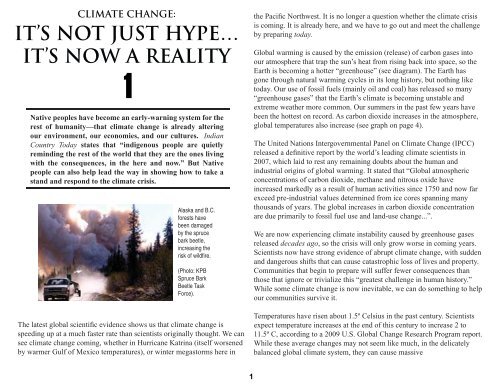Northwest Tribes: Meeting the Challenge of Climate ... - OSU Press
Northwest Tribes: Meeting the Challenge of Climate ... - OSU Press
Northwest Tribes: Meeting the Challenge of Climate ... - OSU Press
Create successful ePaper yourself
Turn your PDF publications into a flip-book with our unique Google optimized e-Paper software.
CLIMATE CHANGE:<br />
IT’S NOT JUST HYPE…<br />
IT’S NOW A REALITY<br />
1<br />
Native peoples have become an early-warning system for <strong>the</strong><br />
rest <strong>of</strong> humanity —that climate change is already altering<br />
our environment, our economies, and our cultures. Indian<br />
Country Today states that “indigenous people are quietly<br />
reminding <strong>the</strong> rest <strong>of</strong> <strong>the</strong> world that <strong>the</strong>y are <strong>the</strong> ones living<br />
with <strong>the</strong> consequences, in <strong>the</strong> here and now.” But Native<br />
people can also help lead <strong>the</strong> way in showing how to take a<br />
stand and respond p to <strong>the</strong> climate crisis.<br />
Alaska and B.C.<br />
forests have<br />
been damaged<br />
by <strong>the</strong> spruce<br />
bark beetle,<br />
increasing <strong>the</strong><br />
risk <strong>of</strong> wildfi re.<br />
(Photo: KPB<br />
Spruce Bark<br />
Beetle Task<br />
Force).<br />
The latest global scientifi c evidence shows us that climate change is<br />
speeding up at a much faster rate than scientists originally thought. We can<br />
see climate change coming, whe<strong>the</strong>r in Hurricane Katrina (itself worsened<br />
by warmer Gulf <strong>of</strong> Mexico temperatures), or winter megastorms here in<br />
1<br />
<strong>the</strong> Pacifi c <strong>Northwest</strong>. It is no longer a question whe<strong>the</strong>r <strong>the</strong> climate crisis<br />
is coming. It is already here, and we have to go out and meet <strong>the</strong> challenge<br />
by preparing today.<br />
Global warming is caused by <strong>the</strong> emission (release) <strong>of</strong> carbon gases into<br />
our atmosphere that trap <strong>the</strong> sun’s heat from rising back into space, so <strong>the</strong><br />
Earth is becoming a hotter “greenhouse” (see diagram). The Earth has<br />
gone through natural warming cycles in its long history, but nothing like<br />
today. Our use <strong>of</strong> fossil fuels (mainly oil and coal) has released so many<br />
“greenhouse gases” that <strong>the</strong> Earth’s climate is becoming unstable and<br />
extreme wea<strong>the</strong>r more common. Our summers in <strong>the</strong> past few years have<br />
been <strong>the</strong> hottest on record. As carbon dioxide increases in <strong>the</strong> atmosphere,<br />
global temperatures also increase (see graph on page 4).<br />
The United Nations Intergovernmental Panel on <strong>Climate</strong> Change (IPCC)<br />
released a defi nitive report by <strong>the</strong> world’s leading climate scientists in<br />
2007, which laid to rest any remaining doubts about <strong>the</strong> human and<br />
industrial origins <strong>of</strong> global warming. It stated that “Global atmospheric<br />
concentrations <strong>of</strong> carbon dioxide, methane and nitrous oxide have<br />
increased markedly as a result <strong>of</strong> human activities since 1750 and now far<br />
exceed pre-industrial values determined from ice cores spanning many<br />
thousands <strong>of</strong> years. The global increases in carbon dioxide concentration<br />
are due primarily to fossil fuel use and land-use change...”.<br />
We are now experiencing climate instability caused by greenhouse gases<br />
released decades ago, so <strong>the</strong> crisis will only grow worse in coming years.<br />
Scientists now have strong evidence <strong>of</strong> abrupt climate change, with sudden<br />
and dangerous shifts that can cause catastrophic loss <strong>of</strong> lives and property.<br />
Communities that begin to prepare will suffer fewer consequences than<br />
those that ignore or trivialize this “greatest challenge in human history.”<br />
While some climate change is now inevitable, we can do something to help<br />
our communities survive it.<br />
Temperatures have risen about 1.5º Celsius in <strong>the</strong> past century. Scientists<br />
expect temperature increases at <strong>the</strong> end <strong>of</strong> this century to increase 2 to<br />
11.5º C, according to a 2009 U.S. Global Change Research Program report.<br />
While <strong>the</strong>se average changes may not seem like much, in <strong>the</strong> delicately<br />
balanced global climate system, <strong>the</strong>y can cause massive



